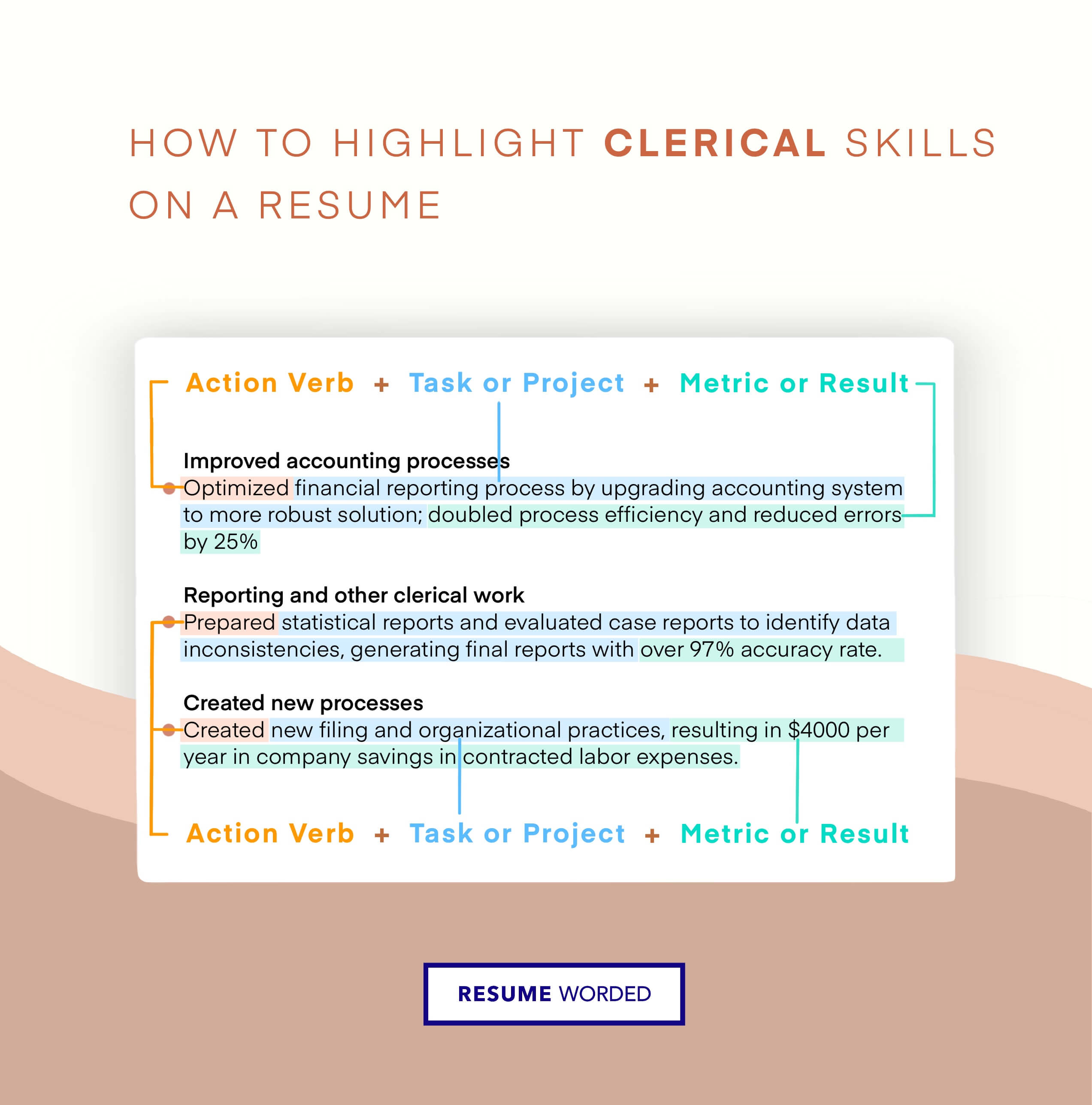If you’ve ever thought about putting the phrase “excellent clerical skills” on a resume — don’t! Not only is it way too broad a category to truly be meaningful, it’s also completely subjective, which means that recruiters aren’t just going to take your word for it.
So, how do you get the same point across? That one’s easy — read our step-by-step guide and follow a few simple pointers to a revamped resume hiring managers will love. Here’s how to begin:
A step-by-step guide for listing clerical skills on a resume
- “Clerical skills” is pretty broad, so start by narrowing it down. What exactly are you good at? Make a list of discrete skills — the more specific the better.
- For each skill on the list, think of at least one example of how you’ve used it in a professional context. For example, if you have an excellent phone manner, think of a time you’ve answered phones at work.
- To turn these examples into concrete accomplishments, start with an action verb that describes what you did, e.g. filed, answered, collected.
- Follow it up with the task or project you completed.
- Quantify your accomplishment with a concrete metric.
- Repeat steps 3-5 for each accomplishment on your resume. You should aim for 3-6 accomplishments in bullet points per job.
- Scan the job description for any essential skills you haven’t included. Better yet, upload it to our Targeted Resume tool to automatically identify missing skills and keywords.
Here’s an example of showing — not telling — when it comes to including soft skills like clerical skills on your resume.
A good way to check if you’ve shown your clerical skills and other soft skills the right way is to upload your resume to the tool below — it’ll scan your resume and let you know if you have highlighted clerical skills and other soft skills such as organization, attention to detail and communication.
Where to put clerical skills on your resume
The ideal place to list clerical skills on your resume is in your work experience section. This allows you to go a bit more in-depth about your accomplishments and how you’ve used your clerical skills in action.
Here’s an example of a work experience section that highlights clerical skills:
How to include clerical skills on a resume
Here are some dos and don’ts for including clerical skills on your resume.
Do:
- Include relevant accomplishments in the work experience section of your resume
- Write your accomplishments in bullet point format
- Focus on what you achieved rather than simply listing out your job duties
- Match your accomplishments to duties listed in the job posting
- Carefully proofread your resume to catch any errors — attention to detail is an essential clerical skill
Don’t:
- List clerical skills in your skills section (unless they can be quantified, like typing speed)
- Frame your clerical as subjective self-assessments, e.g. “top-tier office manager with excellent clerical skills”
What clerical skills to highlight on a resume
The term “clerical skills” can be pretty vague, which isn’t ideal for job searching. The more specific you can be about the skills you have, the better it’ll look on your resume. Here are some clerical skills hiring managers are looking for:
- Filing
- Data entry
- Scheduling appointments
- Event planning
- Accounting and bookkeeping
- Taking notes and meeting minutes
- Typing speed and accuracy
- Computer skills (including Microsoft Office and similar software programs)
- Attention to detail
- Time management
- Organization skills
- Multitasking
- Written and verbal communication
Most of these are soft skills, which means you shouldn’t list them in your skills section. Instead, follow the steps above to create impactful resume accomplishments.
How to say you have excellent clerical skills
Every good resume accomplishment starts with a strong action verb that clearly describes what you did. Here are some you may want to consider:
- Filed
- Organized
- Collated
- Ordered
- Purchased
- Collected
- Generated
- Processed
- Implemented
- Cataloged
- Dispatched
- Recorded
- Systematized
- Arranged
- Prepared
Examples of clerical skills on a resume
Filing and data entry
- Indexed, coded, and preserved 40K pages of documents 24 hours before the deadline for future archival storage.
Any accomplishment on your resume can be quantified — even seemingly simple tasks like data entry. Focus on the volume of work or the speed with which you completed it.
Planning and scheduling
- Orchestrated all monthly operation functions which included 5 award ceremonies, 10 executive meetings, and 4 golf outings.
If you’re providing clerical support, chances are you’re going to be responsible for a lot of scheduling and event coordination. Be specific about what types of events (travel, meetings, appointments) you’ve scheduled and their frequency.
Creating new processes
- Created new filing and organizational practices, resulting in $4000 per year in company savings in contracted labor expenses.
Revenue generation and cost savings are some of the best metrics to include on a resume, because they directly affect the company’s bottom line.
Budgeting and accounting
- Optimized financial reporting process by upgrading accounting system to more robust solution; doubled process efficiency and reduced errors by 25%.
Attention to detail is key in financial and administrative positions. Point out how you fixed errors or identified inconsistencies and how that benefited the company.










